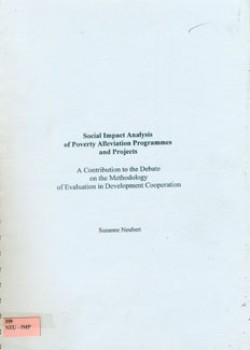
Social Impact Analysis of Poverty Alleviation Programme and Projects
A Contribution to the Debate on the Methodology of Valuation in Development Cooperation
Author : Neubert, Susanne
Year: 1999
Page Numbers: 129
Acc. No: 987
Class No: 339 NEU-IMP
Category: Books & Reports
Subjects: Impact Monitoring
Type of Resource: Monograph
Languages: English
This study of the impact of poverty alleviation programmes considers the state of research on evaluation, including the social dimension and methodology, illustrates the evolution of evaluation in the field of development co-operation, and shows successful and inadequate analysing methods. A new method of impact assessment of poverty alleviation projects (MAPP) is also presented and underpinned, empirically. MAPP is based on a multidimensional conception of poverty and shows how the social dimension can be operationalized with the aid of four key social processes: improvement of livelihoods, access to resources, expansion of knowledge, and participation in rights. MAPP is a participatory and process-oriented tool and makes it possible to determine whether the poverty of the target groups has actually been alleviated and, if so, how the benefits of the project have been distributed among the various social groups, for example, by gender and socio-professional categories. This study was carried out at the German Development Institute (GDI) in Berlin.



